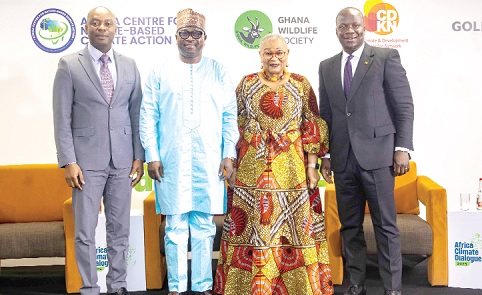The government is coming up with a policy that seeks to institutionalise climate change and sustainability units across all ministries and metropolitan, municipal and district assemblies (MMDAs).
The move is meant to ensure that climate considerations are mainstreamed into every level of governance, from national planning and budgeting to local implementation.
The Minister of State for Climate Change and Sustainability, Seidu Issifu, made this known at a high-level nature policy dialogue organised by the Africa Centre for Nature-Based Climate Action (AC4NCA) in Accra.
He said institutionalising climate change leadership across public institutions would foster “a truly whole-of-government approach that delivers coherent, integrated and measurable outcomes.”
Additionally, Mr Issifu said the government in the process of establishing national climate change and sustainability hub, a centre of excellence dedicated to driving policy innovation, capacity building and knowledge exchange.
“The Hub will serve as a national platform for research, data sharing and cross-sectoral collaboration, bridging the gap between science, policy and practice,” he said.
Dialogue
The dialogue which was held on the theme: “Harnessing nature-based solutions: a pathway to sustainable national development,” brought together policymakers, researchers, entrepreneurs and climate advocates to explore innovative interventions for positive climate action.
Present at the dialogue were a former Minister of Lands and Natural Resources, Samuel A. Jinapor, who doubles as the Global Lead of AC4NCA; the Board chair of AC4NCA, Rev. Joyce Aryee; the Chief Executive of the Forestry Commission, Dr Hugh Brown; Director of Environment at the Ministry of Environment, Science and Technology (MEST), Dr Peter Dery; civil society organisations (CSOs) and other actors in the environment and climate change space.
Timely dialogue
Mr Issifu described the dialogue as a timely initiative as it provided an opportunity for collaboration and reflected on how stakeholders could collectively accelerate the country’s transition towards a climate-resilient, low-carbon and sustainable future.
He said the theme of the dialogue was relevant and spoke to the triple crisis of climate change, biodiversity loss and land degradation confronting African countries.
“These challenges threaten our food systems, water security and livelihoods. Yet, within these challenges lies an immense opportunity if only we choose to work with nature and not against it,” he said.
Forestry Commission initiatives
The CEO of the Forestry Commission said although the country was confronted with a planetary crisis, the challenge could be dealt with if the right strategies were adopted.
He stressed that nature had the capacity to solve these complex planetary challenges by itself when nature-based solutions were adopted.
Dr Brown said it was in recognition of the critical role nature-based solutions played in addressing climate change impacts that the Forestry Commission had implemented forest landscape restoration initiatives such as forest plantation development, enrichment planting, mangrove restoration and incorporation of trees in farming systems.
Again, he said the commission was promoting urban forestry through the distribution of free tree seedlings for amenity planting while also prioritising the protection and sustainable management of mangrove ecosystems and wetlands.
Illegal mining
He said despite the great initiatives, the Forestry Commission had implemented to protect the country’s forests, it was worrying that illegal mining and illegal logging activities in forest reserves continued to destroy the reserves.
While commending the government for the efforts to deal with illegal mining, Dr Brown said tackling illegal mining and restoring forest ecosystems required collective action by all stakeholders.
Leveraging potentials
Rev. Dr Aryee said the AC4NCA was committed to working closely with all stakeholders, locally and internationally, to leverage the opportunities of climate action.
She observed that while the world was still struggling with the interconnected and growing problems of land degradation, biodiversity loss and climate change, it was important to recognise that bold collective action could help to build resilience to the crisis.
“As a centre, we believe that the formidable obstacles of climate change also present remarkable chances for change.
We can use nature's power to repair damaged landscapes, shield our communities from climatic shocks, and generate green jobs that promote equitable economic growth,” she said.
She said nature-based solutions was the most cost effective and practical pathway to environmental protection, social and economic progress.

